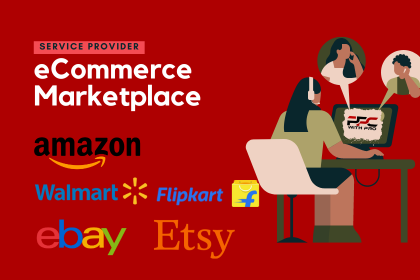
Ecommerce Marketplace Service Provider: Revolutionizing Online Shopping
Introduction
In the fast-paced digital era, online shopping has become an integral part of our lives. With the rise of ecommerce, businesses are constantly striving to enhance their online presence and reach a broader customer base. To facilitate this growth, the role of ecommerce marketplace service providers has become crucial. In this article, we will explore the significance of ecommerce marketplace service providers and how they have revolutionized the way we shop online.
Table of Contents
- What is an Ecommerce Marketplace?
- The Role of Ecommerce Marketplace Service Providers
- Benefits of Using Ecommerce Marketplace Service Providers
- How Ecommerce Marketplace Service Providers Work
- Key Features and Tools Offered by Ecommerce Marketplace Service Providers
- Choosing the Right Ecommerce Marketplace Service Provider
- Tips for Success on Ecommerce Marketplaces
- Case Studies: Successful Businesses Leveraging Ecommerce Marketplaces
- Future Trends in Ecommerce Marketplace Services
- Conclusion
- FAQs
1. What is an Ecommerce Marketplace?
An ecommerce marketplace is a digital platform where multiple sellers can list and sell their products or services. It brings together buyers and sellers, creating a convenient and efficient way to conduct online transactions. Examples of popular ecommerce marketplaces include Amazon, eBay, and Alibaba.
2. The Role of Ecommerce Marketplace Service Providers
Ecommerce marketplace service providers play a vital role in facilitating the operations of online marketplaces. They offer a range of services and tools that enable businesses to set up their online stores, manage inventory, process payments, and handle logistics. These service providers act as intermediaries, connecting sellers with potential buyers and ensuring smooth transactions.
3. Benefits of Using Ecommerce Marketplace Service Providers
Using ecommerce marketplace, service providers offers several benefits for businesses:
- Increased Reach: Ecommerce marketplaces have a vast customer base, providing businesses with access to a large audience that they might not reach otherwise.
- Established Infrastructure: Service providers already have the necessary infrastructure in place, including secure payment gateways and logistics solutions, saving businesses time and resources.
- Brand Exposure: By listing products on popular marketplaces, businesses can enhance their brand visibility and gain credibility among consumers.
- Lower Costs: Setting up an independent ecommerce website can be expensive. Ecommerce marketplace service providers offer cost-effective solutions, allowing businesses to start selling online with minimal investment.
4. How Ecommerce Marketplace Service Providers Work
Ecommerce marketplace service providers operate by offering businesses a platform to showcase their products or services. Here’s a step-by-step breakdown of how they work:
- Seller Registration: Businesses sign up with the service provider, providing necessary information and verifying their identity.
- Product Listing: Sellers create listings for their products, including detailed descriptions, images, and pricing information.
- Order Management: When a customer places an order, the service provider notifies the seller, who then processes and fulfills the order.
- Payment Processing: Ecommerce marketplace service providers handle the payment process securely, protecting both the buyer and seller.
- Shipping and Logistics: Some service providers offer integrated shipping and logistics solutions, streamlining the delivery process for sellers.
- Customer Support: Marketplaces often provide customer support to address queries, concerns, and issues faced by buyers and sellers.
5. Key Features and Tools Offered by Ecommerce Marketplace Service Providers
Ecommerce marketplace service providers offer a wide range of features and tools to support businesses in their online selling journey. Some common offerings include:
- Seller Dashboards: Comprehensive dashboards that allow sellers to manage their inventory, track sales, and analyze performance metrics.
- Marketing and Advertising Tools: Tools to promote products through targeted advertising, sponsored listings, and deals.
- Mobile Applications: Mobile apps for sellers to manage their online stores on the go and stay connected with customers.
- Analytics and Insights: Detailed analytics and insights to help sellers understand customer behavior, sales trends, and make informed decisions.
- Integration with Third-Party Tools: Integration with popular ecommerce tools, such as inventory management systems and accounting software.
6. Choosing the Right Ecommerce Marketplace Service Provider
When selecting an ecommerce marketplace service provider, businesses should consider the following factors:
- Reputation and Trustworthiness: Choose a service provider with a proven track record and positive reviews from other sellers.
- Target Audience: Evaluate the marketplace’s customer base and determine if it aligns with the target audience for the business’s products or services.
- Fees and Commission Structure: Understand the fee structure, including listing fees, transaction fees, and any commissions charged by the service provider.
- Additional Services: Assess the additional services and tools offered by the provider, such as marketing support, seller education resources, and customer service.
- Integration and Scalability: Determine if the service provider integrates with other tools and platforms, allowing for seamless expansion and growth.
7. Tips for Success on Ecommerce Marketplaces
To thrive on ecommerce marketplaces, businesses should consider the following tips:
- Optimize Product Listings: Create compelling and detailed product descriptions, high-quality images, and accurate categorization to enhance visibility and conversion rates.
- Competitive Pricing: Research competitors’ pricing and offer competitive prices to attract buyers.
- Provide Excellent Customer Service: Respond promptly to customer inquiries and address concerns to build trust and loyalty.
- Leverage Marketing Tools: Utilize the marketing and advertising tools provided by the service provider to increase product visibility and drive traffic.
- Monitor Performance Metrics: Regularly analyze sales data, customer feedback, and marketplace analytics to identify areas for improvement and capitalize on successful strategies.
8. Case Studies: Successful Businesses Leveraging Ecommerce Marketplaces
- Case Study 1: LIKEWARE – How LIKEWARE (Home & Kitchen) increased sales by 50% through strategic product placement and sponsored listings on a popular ecommerce marketplace. Click Here
- Case Study 2: NUDE ENVIE – The NUDE ENVIE (Cosmetic) story of a cosmetic brand that achieved nationwide recognition by leveraging an ecommerce marketplace’s wide reach. Click Here
9. Future Trends in Ecommerce Marketplace Services
The future of ecommerce marketplace services is promising, with several trends shaping the industry:
- Personalization: Marketplaces will focus on delivering personalized experiences to buyers through targeted recommendations and tailored marketing campaigns.
- Integration with Emerging Technologies: Adoption of technologies like artificial intelligence, virtual reality, and augmented reality to enhance the online shopping experience.
- Global Expansion: Ecommerce marketplaces will continue to expand globally, opening doors for businesses to tap into international markets.
- Enhanced Security: Marketplaces will invest in advanced security measures to protect buyer and seller data from cyber threats.
Conclusion
Ecommerce marketplace service providers have revolutionized the way we shop online by providing businesses with a platform to reach a broader audience, streamline operations, and boost sales. By leveraging the services and tools offered by these providers, businesses can unlock new opportunities for growth and establish a strong online presence. As the ecommerce industry continues to evolve, partnering with the right marketplace service provider will be key to success in the dynamic digital landscape.
FAQs
- Q: How do ecommerce marketplace service providers make money?
- A: Ecommerce marketplace service providers generate revenue through various channels, including listing fees, transaction fees, and commissions on sales made through their platforms.
- Q: Can I sell on multiple ecommerce marketplaces simultaneously?
- A: Yes, many businesses sell on multiple marketplaces to reach a wider audience and diversify their sales channels.
- Q: Are there any restrictions on the types of products I can sell on ecommerce marketplaces?
- A: Some marketplaces may have restrictions on certain products, such as regulated goods or prohibited items. It’s important to review the marketplace’s guidelines and policies before listing products.
- Q: Can I customize my online store on an ecommerce marketplace?
- A: While customization options may vary, most marketplaces allow sellers to add their branding elements, product descriptions, and images to create a unique store experience.
- Q: What support is available for sellers on ecommerce marketplaces?
- A: Ecommerce marketplaces typically provide seller support through documentation, help centers, and customer service channels to assist with any queries or issues sellers may encounter.
Looking for expert digital marketing services? Contact “PPC with PRO – Digital Marketing Agency” today for top-notch PPC solutions and drive your online success. Maximize your ROI with our proven strategies. Get in touch now!
Explore Our Services: Click Here
Contact our Business Consultant: Click Here
See Top 10 Digital Marketing Agency: Click Here



